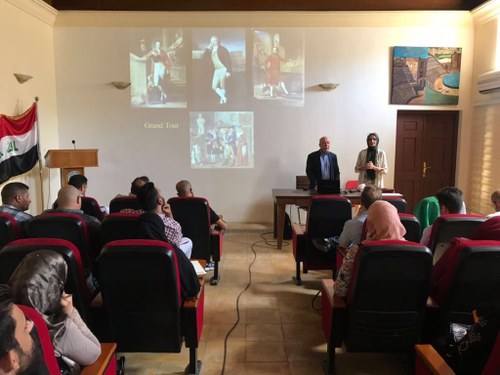The overall objective of EDUU trainings was strengthening the capabilities of local cultural heritage operators and community leaders to promote using Iraqi heritage as a tool for dialogue between different sectors of society. In fact, many operators in the field of cultural heritage and antiquities did not received training systematically, and they usually lack experience with state-of-the-art methods and technologies.
Target groups of the trainings were:
- SBAH operators, since SBAH is in charge of overseeing the management of Iraqi antiquities, managing also the activities of museums and heritage centers);
- community leaders from rural areas; EDUU aimed at raising awareness in the communities that live by archaeological sites in order to enhance the degree of safeguarding over cultural heritage;
- teaching staff and students of Iraqi partner Universities.
The first training’s phase organized by EDUU were “on the field” and they were carried out during the fieldwork campaigns in the regions of Qadisiyah and Wasit from September 2017 until January 2018. These trainings focused on modern techniques for surveying, excavating, recording, cataloging and conserving.
The second phase included training courses in “History of Archaeological Restoration and Museology”; “Controlling the Past, Owning the Future: Public Heritage vs Political Uses of Archaeology in Modern States”; “International Legislation for Protection and Management of Heritage” organised in Baghdad in April 2018. These trainings were mostly traditional lectures (frontal lessons) with the presentation of some case studies, especially for the archaeological restoration and museology. The course of Legislation included also some practical simulations for the creation of nomination lists and management plans, according to the International UNESCO guidelines.
The third phase was held by University of Kufa and Qadisiyah that organised two courses each. The first one was held by Iraqi researchers, with specific skills and expertise in this field. The focus was on the preservation of the local heritage and the enhancement of museums and archaeological sites. The second course, “English Language for Archaeology”, was held by local English teachers, one for each University: it helped to increase the effectiveness of SBAH and cultural heritage operators and help them to better interface with the international community and to utilize English-language archaeological and heritage resources.
Finally, EDUU team also developed a training unit “The Museum and the Society. Some Concepts of Collection Management, Communication Strategies and the Educational Impact of Museums” in e-learning (MOOC). Through the creation of the MOOC, uploaded on a free open-access platform (BOOK), freely available online, we aimed at reaching via the web a large number of Iraqi people interested in cultural heritage preservation and management, thus enlarging considerably our pool of final beneficiaries. The main target groups were the operators working, at different decision-making levels, in museums and cultural institutions in general, and the University students interested in deepening topics related to museology.
The course was divided into four weeks and several modules, each one focusing on a specific theme concerning museums development and management. The topics ranged from the modern concepts of a museum and the main communication strategies employed, to the educational role and teaching methods of cultural institutions, to their social impact on society. The theoretical framework was completed by an in-depth analysis of the Iraq National Museum of Baghdad as a good case study of museum's renovation.
At the end of the course, students and cultural heritage operators were provided with a consistent series of good practices in museum and collection management, exhibitions design, communication strategies for engaging visitors, emergency preparedness, among other competencies.


